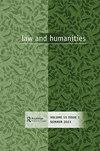通过当代西班牙电影感知正义:美学,政治,法律通过当代西班牙电影感知正义:美学,政治,法律,Mónica López Lerma,爱丁堡,爱丁堡大学出版社,2021,183页,19.99英镑(平装本),ISBN: 9781474442053
IF 0.2
Q3 LAW
引用次数: 0
摘要
注1 Davide Panagia和Jacques ranci本文章由计算机程序翻译,如有差异,请以英文原文为准。
Sensing justice through contemporary Spanish cinema: aesthetics, politics, law Sensing justice through contemporary Spanish cinema: aesthetics, politics, law , by Mónica López Lerma, Edinburgh, Edinburgh University Press, 2021, 183 pp., £19.99 (paperback), ISBN: 9781474442053
Click to increase image sizeClick to decrease image size Notes1 Davide Panagia and Jacques Rancière, ‘Dissenting Words: A Conversation with Jacques Rancière’ (2000) 30(2) Diacritics 115.2 See Mónica López Lerma and Julen Etxabe, Rancière and Law (Routledge 2018).3 Desmond Manderson, Songs without Music: Aesthetic Dimensions of Law and Justice (University of California Press 2000) 28.4 Mieke Bal, Travelling Concepts in the Humanities: A Rough Guide (Toronto University Press 2002) 137.5 Ruth Hertz, ‘Almodóvar’s High Heels Revisited: A Scandalous or Thought-Provoking Portrayal of a Judge?’ (2023) 17(1) Law and Humanities 193.6 Because the democratic potential of film is exclusively framed in terms of Rancière’s thought, which emphasizes moments of rupture, it opens up the problematic of the inscription of political acts. As Aletta Norval observes, one underdeveloped aspect of Rancière’s characterization of democracy is his tendency ‘to refrain from explicitly engaging with the issues that arise after moments of rupture, when previously excluded senses of wrong become visible and alternative ways of doing things need to become institutionalized and thus inscribed into the current order.’ According to Norval, it is important to supplement Rancière’s characterization of democracy as rupture with an account of how this rupture is inscribed onto the larger political horizon. See Arletta Norval, ‘“Writing a Name in the Sky”: Rancière, Cavell, and the Possibility of Egalitarian Inscription’ in Nikolas Kompridis (ed), The Aesthetic Turn in Political Thought (Bloomsbury Academic 2014) 194.
求助全文
通过发布文献求助,成功后即可免费获取论文全文。
去求助
来源期刊

Law and Humanities
LAW-
CiteScore
1.00
自引率
0.00%
发文量
21
期刊介绍:
Law and Humanities is a peer-reviewed journal, providing a forum for scholarly discourse within the arts and humanities around the subject of law. For this purpose, the arts and humanities disciplines are taken to include literature, history (including history of art), philosophy, theology, classics and the whole spectrum of performance and representational arts. The remit of the journal does not extend to consideration of the laws that regulate practical aspects of the arts and humanities (such as the law of intellectual property). Law and Humanities is principally concerned to engage with those aspects of human experience which are not empirically quantifiable or scientifically predictable. Each issue will carry four or five major articles of between 8,000 and 12,000 words each. The journal will also carry shorter papers (up to 4,000 words) sharing good practice in law and humanities education; reports of conferences; reviews of books, exhibitions, plays, concerts and other artistic publications.
 求助内容:
求助内容: 应助结果提醒方式:
应助结果提醒方式:


